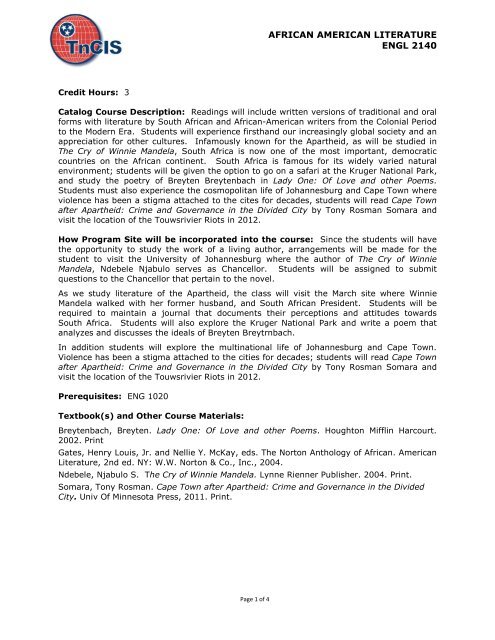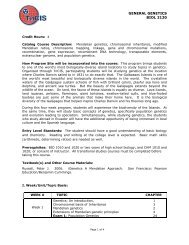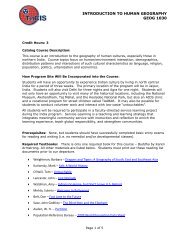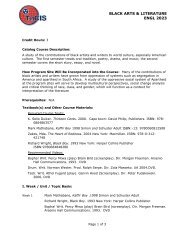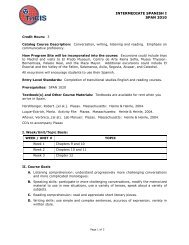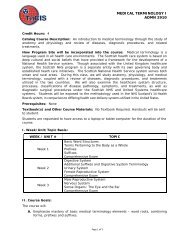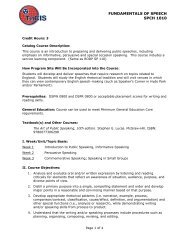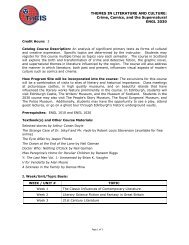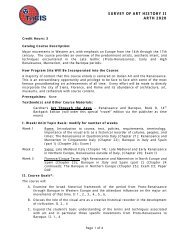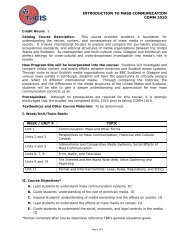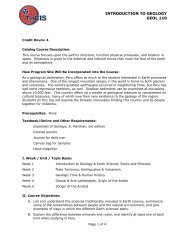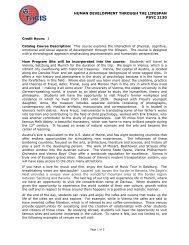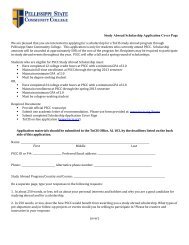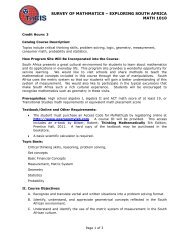AFRICAN AMERICAN LITERATURE ENGL 2140
AFRICAN AMERICAN LITERATURE ENGL 2140
AFRICAN AMERICAN LITERATURE ENGL 2140
Create successful ePaper yourself
Turn your PDF publications into a flip-book with our unique Google optimized e-Paper software.
<strong>AFRICAN</strong> <strong>AMERICAN</strong> <strong>LITERATURE</strong><strong>ENGL</strong> <strong>2140</strong>Credit Hours: 3Catalog Course Description: Readings will include written versions of traditional and oralforms with literature by South African and African-American writers from the Colonial Periodto the Modern Era. Students will experience firsthand our increasingly global society and anappreciation for other cultures. Infamously known for the Apartheid, as will be studied inThe Cry of Winnie Mandela, South Africa is now one of the most important, democraticcountries on the African continent. South Africa is famous for its widely varied naturalenvironment; students will be given the option to go on a safari at the Kruger National Park,and study the poetry of Breyten Breytenbach in Lady One: Of Love and other Poems.Students must also experience the cosmopolitan life of Johannesburg and Cape Town whereviolence has been a stigma attached to the cites for decades, students will read Cape Townafter Apartheid: Crime and Governance in the Divided City by Tony Rosman Somara andvisit the location of the Touwsrivier Riots in 2012.How Program Site will be incorporated into the course: Since the students will havethe opportunity to study the work of a living author, arrangements will be made for thestudent to visit the University of Johannesburg where the author of The Cry of WinnieMandela, Ndebele Njabulo serves as Chancellor. Students will be assigned to submitquestions to the Chancellor that pertain to the novel.As we study literature of the Apartheid, the class will visit the March site where WinnieMandela walked with her former husband, and South African President. Students will berequired to maintain a journal that documents their perceptions and attitudes towardsSouth Africa. Students will also explore the Kruger National Park and write a poem thatanalyzes and discusses the ideals of Breyten Breytrnbach.In addition students will explore the multinational life of Johannesburg and Cape Town.Violence has been a stigma attached to the cities for decades; students will read Cape Townafter Apartheid: Crime and Governance in the Divided City by Tony Rosman Somara andvisit the location of the Touwsrivier Riots in 2012.Prerequisites: ENG 1020Textbook(s) and Other Course Materials:Breytenbach, Breyten. Lady One: Of Love and other Poems. Houghton Mifflin Harcourt.2002. PrintGates, Henry Louis, Jr. and Nellie Y. McKay, eds. The Norton Anthology of African. AmericanLiterature, 2nd ed. NY: W.W. Norton & Co., Inc., 2004.Ndebele, Njabulo S. The Cry of Winnie Mandela. Lynne Rienner Publisher. 2004. Print.Somara, Tony Rosman. Cape Town after Apartheid: Crime and Governance in the DividedCity. Univ Of Minnesota Press, 2011. Print.Page 1 of 4
I. Week/Unit/Topic Basis:Week 1WEEK / UNIT #SPRITUALS/THE VERNACULARTRADITIONS OF SLAVERY ANDFREEDOM 1712-1865 andRECONSTRUCTION TO THE NEWNEGRO RENAISSANCE 1865-1919Week 2HARLEM RENAISSANCE 1919-1940(THE GREAT MIGRATION 1919)and REALISM, NATURALISM,MODERNISM 1940-1960Week 3REALISM, NATURALISM,MODERNISM 1940-1960 and TheBlack Arts Era (1960-1975, text).Modernism (1975-present, text)TOPIC“Go Down Moses” “God’s a-Gonna Trouble theWater” “Soon I will Be Done” “This “Little Light ofMine” Take My Hand, Precious Lord”Read short stories from The Cry of Winnie MandelaOlaudah EquianoBegin Folktales Folktales “De Reason Niggers IsWorking So hard” pg 140Brer Rabbit Tricks Brer Fox Again” pg 142“How Mr. Rabbit Was Too Sharp for Mr. Fox” pg 145“The Awful Fate of Mr. Wolf” pg 146 and “What theRabbit Learned” pg 148Read short stories from The Cry of Winnie MandelaExam on The Cry of Winnie MandelaSelected poems from Lady One: Of Love and otherPoemsThe Man Who was Almost a Man”The Negro Speaks of Rivers” pg 1291 “Mother toSon” pg 1292“I’ Too” pg 1295 “Song for a Dark Girl” 1299“Mulatto” pg 1298“Christ in Alabama” pg 1302 “Lady One: Of Love and other PoemsExam on Lady One: Of Love and other PoemsCape Town after Apartheid: Crime and Governancein the Divided City.Martin Luther King Jr. “I Have a Dream” pg 107“I’ve Been to the Mountaintop” pg 110 “Malcom X:The Ballot or the Bullet” pg 110“A More Perfect Union”Exam on Cape Town after Apartheid: Crime andGovernance in the Divided City.II. Course Goals:The course will:A. Analyze essays, poetry, and stories in the Gates textbook as forms of cultural andcreative expression. Explain the ways in which humanistic and/or literary approachthroughout the ages expresses the culture and values of its time and place.B. Explain and trace the ways in which humanistic expression in African American oraltradition and various works throughout the 17th – 21st centuries portrays the cultureand values of time and place. Frame a comparative context through which studentscan critically assess the ideas, forces, and values that have created the modernworld.Page 2 of 4
C. Recognize the ways in which both change and continuity have affected humanhistory.D. Explore and trace the global/cultural diversity between Africans and southern slavesas well as contemporary culture in the Ndeble novel. Practice the critical andanalytical methodologies of the Humanities and/or Fine Arts.III. Expected Student Learning Outcomes*Upon successful completion of this course, the student should be able to:A. Discuss knowledgeably about a variety of time periods and literary works throughquizzes. (Section II A,B,C)B. Exhibit knowledge of biographical information, opinions, and facts for authors,historical periods, and culture from 1600 to the present and portrays the culture andvalues of time and place. (Section II B, C)C. Identify themes and motifs through African American literature from the vernacularto modernism in written discussion responses. (Section II C)D. Write accurate, factual responses in tests and papers, expressing valid ideas andcritical thinking about the assigned works. (Section II A, B)E. Discuss knowledgeably about a variety of time periods and literary works throughquizzes. and in the Njabulo novel in research projects/assignments. (Section II A, B)F. Describe the ways that change from one nation to another has affected AfricanAmericans in the primary textbook and in the Bailey novel in researchprojects/assignments. (Section II B, C, D)*Letters after performance expectations reference the course goals listed above.IV. Evaluation:A. Testing Procedures: Every class meeting students will take a short answer quiz onthe readings assigned the previous class meeting. Students will also be evaluated ontheir ability to compose critical/analytical essay. Testing Procedures: 300 pts -Three (3) unit exams will be given. One of the exams will pertain exclusively to theNjabulo novel. Exams may include short answer, multiple choice, and essayquestions. Each exam will be cumulative of the unit.B. Laboratory Expectations: Students will be required to keep an Excursion journal.Once a week the class will visit a location in South Africa that contributes to thenovel that is being read in the class and incorporates South Africa into the course. .100 pts - Reading/excursion journal. Students will keep a journal with guided focuson reading material, as well as excursion observationsC. Other Evaluation Methods:Rubric for Research Essay- Students will be given arubric that will be used to evaluate their Research Essays. Work Ethic: includesclass preparation and participation; attendance in class and field excurstons; abilityto work with classmates/D. Other Evaluation Methods: Quizzes/Reading Responses / In class discussions /Research EssaysPage 3 of 4
E. Grading Scale: Please note that some TnCIS member institutions do not accept +and - grades, therefore all TnCIS grading scales must consist of only A, B, C, D, Fletter grades.V. Policies:A = 90-100B = 89-80C = 70-79D = 65-69F = 64-0A. Attendance Policy:Attendance is of utmost importance in study abroad courses. There are no unexcusedabsences permitted. Unexcused absences are grounds for removal from the program.Being in class on time is also very important. Frequent tardiness will be considered anabsence and appropriate action will be taken. Absences due to illness must be reportedimmediately to the program director.B. Academic Dishonesty:Academic misconduct committed either directly or indirectly by an individual or group issubject to disciplinary action. Prohibited activities include but are not limited to thefollowing practices:• Cheating, including but not limited to unauthorized assistance from material,people, or devices when taking a test, quiz, or examination; writing papers orreports; solving problems; or completing academic assignments.• Plagiarism, including but not limited to paraphrasing, summarizing, or directlyquoting published or unpublished work of another person, including online orcomputerized services, without proper documentation of the original source.• Purchasing or otherwise obtaining prewritten essays, research papers, ormaterials prepared by another person or agency that sells term papers or otheracademic materials to be presented as one’s own work.• Taking an exam for another student.• Providing others with information and/or answers regarding exams, quizzes,homework or other assignments unless explicitly authorized by the instructor.In addition to other possible disciplinary sanctions that may be imposed as a result ofacademic misconduct, the instructor has the authority to assign either (1) an F or zerofor the assignment or (2) an F for the course.VI. Instructional Hours:Instructional time spent in a formal classroom setting and during excursions will total aminimum of 37.5 hours for this course.Page 4 of 4


